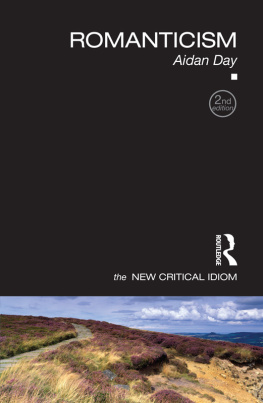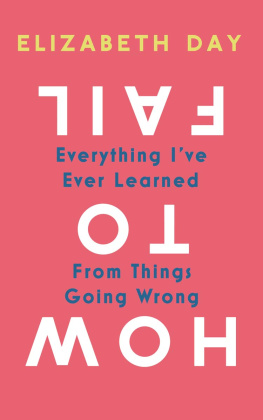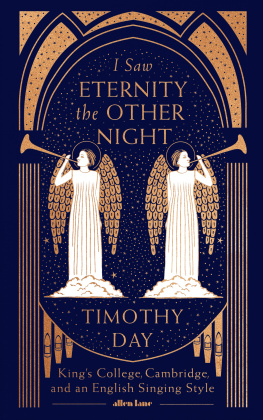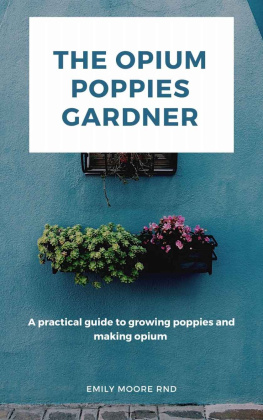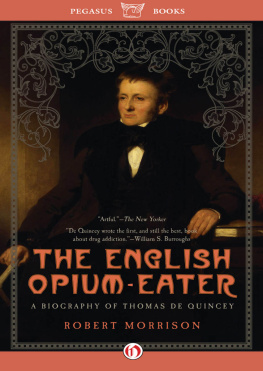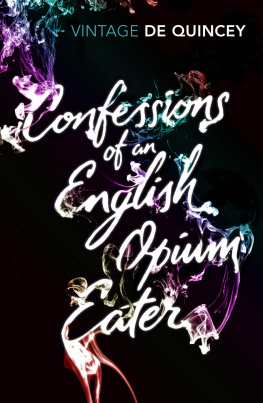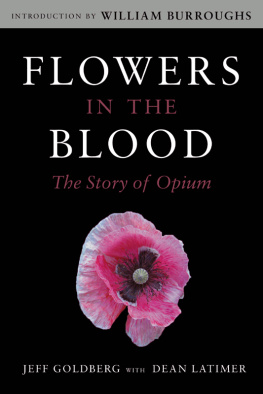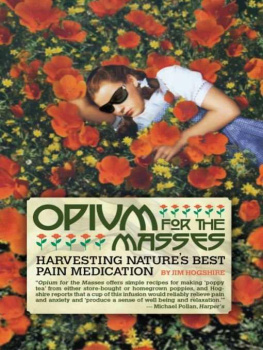Day - The The Opium Habit: with suggestions as to the remedy
Here you can read online Day - The The Opium Habit: with suggestions as to the remedy full text of the book (entire story) in english for free. Download pdf and epub, get meaning, cover and reviews about this ebook. City: Luton?;United States, year: 2012, publisher: Andrews UK Ltd., genre: Science. Description of the work, (preface) as well as reviews are available. Best literature library LitArk.com created for fans of good reading and offers a wide selection of genres:
Romance novel
Science fiction
Adventure
Detective
Science
History
Home and family
Prose
Art
Politics
Computer
Non-fiction
Religion
Business
Children
Humor
Choose a favorite category and find really read worthwhile books. Enjoy immersion in the world of imagination, feel the emotions of the characters or learn something new for yourself, make an fascinating discovery.

The The Opium Habit: with suggestions as to the remedy: summary, description and annotation
We offer to read an annotation, description, summary or preface (depends on what the author of the book "The The Opium Habit: with suggestions as to the remedy" wrote himself). If you haven't found the necessary information about the book — write in the comments, we will try to find it.
The The Opium Habit: with suggestions as to the remedy — read online for free the complete book (whole text) full work
Below is the text of the book, divided by pages. System saving the place of the last page read, allows you to conveniently read the book "The The Opium Habit: with suggestions as to the remedy" online for free, without having to search again every time where you left off. Put a bookmark, and you can go to the page where you finished reading at any time.
Font size:
Interval:
Bookmark:
THE OPIUM HABIT
WITH
SUGGESTIONS AS TO THE REMEDY
Horace B Day
This edited version, including layout, typography, additions to text, cover artwork and other unique factors is copyright 2012 Andrews UK Limited
This book is sold subject to the condition that it shall not, by way of trade or otherwise, be lent, resold, hired out or otherwise circulated without the publishers prior written consent in any form of binding or cover other than that in which it is published, and without a similar condition being imposed on the subsequent purchaser.
INTRODUCTION.
This volume has been compiled chiefly for the benefit of opium-eaters. Its subject is one indeed which might be made alike attractive to medical men who have a fancy for books that are professional only in an accidental way; to general readers who would like to see gathered into a single volume the scattered records of the consequences attendant upon the indulgence of a pernicious habit; and to moralists and philanthropists to whom its sad stories of infirmity and suffering might be suggestive of new themes and new objects upon which to bestow their reflections or their sympathies. But for none of these classes of readers has the book been prepared. In strictness of language little medical information is communicated by it. Incidentally, indeed, facts are stated which a thoughtful physician may easily turn to professional account. The literary man will naturally feel how much more attractive the book might have been made had these separate and sometimes disjoined threads of mournful personal histories been woven into a more coherent whole; but the book has not been made for literary men. The philanthropist, whether a theoretical or a practical one, will find in its pages little preaching after his particular vein, either upon the vice or the danger of opium-eating. Possibly, as he peruses these various records, he may do much preaching for himself, but he will not find a great deal furnished to his hand, always excepting the rather inopportune reflections of Mr. Joseph Cottle over the case of his unhappy friend Coleridge. The book has been compiled for opium-eaters, and to their notice it is urgently commended. Sufferers from protracted and apparently hopeless disorders profit little by scientific information as to the nature of their complaints, yet they listen with profound interest to the experience of fellow-sufferers, even when this experience is unprofessionally and unconnectedly told. Medical empirics understand this and profit by it. In place of the general statements of the educated practitioner of medicine, the empiric encourages the drooping hopes of his patient by narrating in detail the minute particulars of analagous cases in which his skill has brought relief.
Before the victim of opium-eating is prepared for the services of an intelligent physician he requires some stimulus to rouse him to the possibility of recovery. It is not the dicta of the medical man, but the experience of the relieved patient, that the opium-eater, desiring - nobody but he knows how ardently - to enter again into the world of hope, needs, to quicken his paralyzed will in the direction of one tremendous effort for escape from the thick night that blackens around him. The confirmed opium-eater is habitually hopeless. His attempts at reformation have been repeated again and again; his failures have been as frequent as his attempts. He sees nothing before him but irremediable ruin. Under such circumstances of helpless depression, the following narratives from fellow-sufferers and fellow-victims will appeal to whatever remains of his hopeful nature, with the assurance that others who have suffered even as he has suffered, and who have struggled as he has struggled, and have failed again and again as he has failed, have at length escaped the destruction which in his own case he has regarded as inevitable.
The number of confirmed opium-eaters in the United States is large, not less, judging from the testimony of druggists in all parts of the country as well as from other sources, than eighty to a hundred thousand. The reader may ask who make up this unfortunate class, and under what circumstances did they become enthralled by such a habit? Neither the business nor the laboring classes of the country contribute very largely to the number. Professional and literary men, persons suffering from protracted nervous disorders, women obliged by their necessities to work beyond their strength, prostitutes, and, in brief, all classes whose business or whose vices make special demands upon the nervous system, are those who for the most part compose the fraternity of opium-eaters. The events of the last few years have unquestionably added greatly to their number. Maimed and shattered survivors from a hundred battle-fields, diseased and disabled soldiers released from hostile prisons, anguished and hopeless wives and mothers, made so by the slaughter of those who were dearest to them, have found, many of them, temporary relief from their sufferings in opium.
There are two temperaments in respect to this drug. With persons whom opium violently constricts, or in whom it excites nausea, there is little danger that its use will degenerate into a habit. Those, however, over whose nerves it spreads only a delightful calm, whose feelings it tranquillizes, and in whom it produces an habitual state of reverie, are those who should be upon their guard lest the drug to which in suffering they owe so much should become in time the direst of curses. Persons of the first description need little caution, for they are rarely injured by opium. Those of the latter class, who have already become enslaved by the habit, will find many things in these pages that are in harmony with their own experience; other things they will doubtless find of which they have had no experience. Many of the particular effects of opium differ according to the different constitutions of those who use it. In De Quincey it exhibited its power in gorgeous dreams in consequence of some special tendency in that direction in De Quincey's temperament, and not because dreaming is by any means an invariable attendant upon opium-eating. Different races also seem to be differently affected by its use. It seldom, perhaps never, intoxicates the European; it seems habitually to intoxicate the Oriental. It does not generally distort the person of the English or American opium-eater; in the East it is represented as frequently producing this effect.
It is doubtful whether a sufficient number of cases of excess in opium-eating or of recovery from the habit have yet been recorded, or whether such as have been recorded have been so collated as to warrant a positive statement as to all the phenomena attendant upon its use or its abandonment. A competent medical man, uniting a thorough knowledge of his profession with educated habits of generalizing specific facts under such laws - affecting the nervous, digestive, or secretory system - as are recognized by medical science, might render good service to humanity by teaching us properly to discriminate in such cases between what is uniform and what is accidental. In the absence, however, of such instruction, these imperfect, and in some cases fragmentary, records of the experience of opium-eaters are given, chiefly in the language of the sufferers themselves, that the opium-eating reader may compare case with case, and deduce from such comparison the lesson of the entire practicability of his own release from what has been the burden and the curse of his existence. The entire object of the compilation will have been attained, if the narratives given in these pages shall be found to serve the double purpose of indicating to the beginner in opium-eating the hazardous path he is treading, and of awakening in the confirmed victim of the habit the hope that he may be released from the frightful thraldom which has so long held him, infirm in body, imbecile in will, despairing in the present, and full of direful foreboding for the future.
Next pageFont size:
Interval:
Bookmark:
Similar books «The The Opium Habit: with suggestions as to the remedy»
Look at similar books to The The Opium Habit: with suggestions as to the remedy. We have selected literature similar in name and meaning in the hope of providing readers with more options to find new, interesting, not yet read works.
Discussion, reviews of the book The The Opium Habit: with suggestions as to the remedy and just readers' own opinions. Leave your comments, write what you think about the work, its meaning or the main characters. Specify what exactly you liked and what you didn't like, and why you think so.


